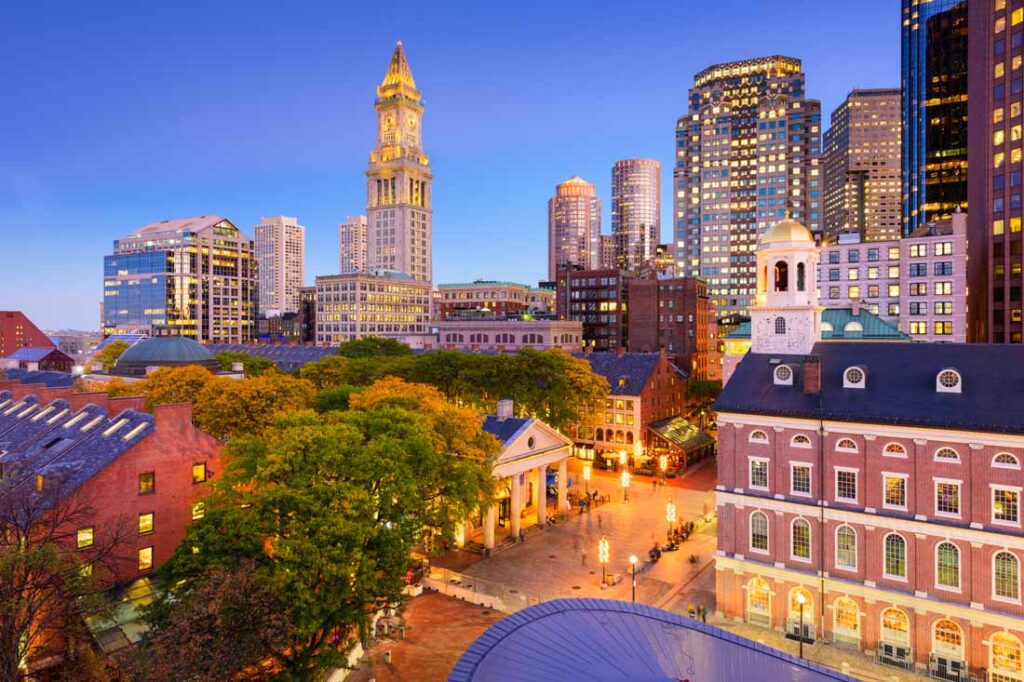Choosing the right location to launch a business can have a big impact on long-term success and growth potential. Entrepreneurs face countless decisions when launching a venture, and selecting the best fit city ranks among the most crucial. The best cities to start a business provide a balanced blend of affordability, talent access, infrastructure and supportive ecosystems that empower new companies to thrive.
Smaller and mid-sized cities across the U.S. often offer favorable conditions for entrepreneurs. These cities tend to have lower housing costs, reasonable business expenses and active local policies that focus on stimulating economic growth. In addition to cost savings, these cities often boast ample access to skilled labor pools, strong community networks and vibrant innovation scenes. This makes them fertile ground for startups and small businesses.

10 Best Cities to Start a Business In Across the U.S.
Discover some of the best places in the U.S. to consider when it comes to starting a business. Consider the different attributes and what might work best for your business by browsing the ideas below.
1. Austin, Texas

- Population: 961,855
- Known for: Economic strength and opportunity
Austin stands out as a city where economic stability and job growth create a rich environment for entrepreneurs. It boasts a strong tech sector fueled by companies like Dell, Apple and Google, which contributes to an innovative ecosystem ripe with opportunity.
According to the U.S. Bureau of Labor Statistics, Austin’s job growth consistently outpaces the national average. This economic dynamism attracts talent and increases consumer demand, two critical factors that help startups gain traction. Austin’s local industries span technology, health care and creative sectors, providing diverse opportunities for new businesses. Plus, there’s a sizable population of young talent in the area from the University of Texas. Austin was also named one of the best cities to start a business in a recent USA Today study.
2. Wilmington, North Carolina
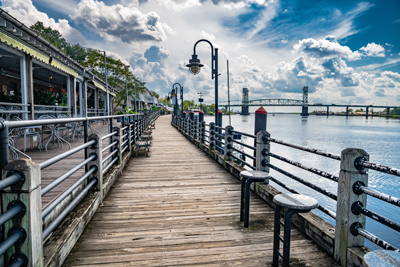
- Population: 115,451
- Known for: Supportive ecosystems
North Carolina in general ranks highly as one of the best states to start a business in, and Wilmington has several specific advantages. It’s an ideal match for small businesses thanks to its thriving local economy and strong support systems. With around 15 businesses per 100 people, Wilmington has an ultra-high business density. The downtown area alone is home to nearly 900 businesses, including popular hotspots like Flytrap Brewing and Fuzzy Peach, a frozen yogurt chain founded by UNC-Wilmington graduates. This dense business community creates ample networking opportunities.
Entrepreneurs in Wilmington benefit from an active chamber of commerce that organizes B2B expos and training seminars and provides listings in a comprehensive business directory. These resources help small business owners connect, grow and succeed.
3. Fayetteville, Arkansas
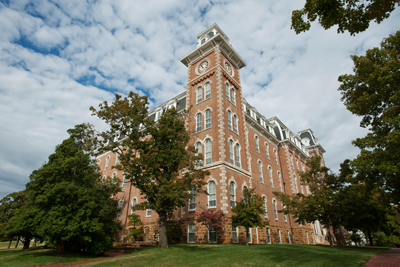
- Population: 93,949
- Known for: Affordability and accessibility
Arkansas is another top state to start a business in, and Fayetteville is a prime pick. Small cities like Fayetteville offer crucial advantages for startups, particularly in terms of affordability. Rent, utilities and workforce costs are significantly lower than many other economic hubs in the country. This cozy city also feels partly like a large, vibrant college town thanks to the University of Arkansas. In this location, businesses have the chance to allocate more of their budget to growing.
Fayetteville’s location in northwest Arkansas provides excellent transportation access, including proximity to major interstates and a regional airport. The city also offers a growing coworking scene and accessible office spaces tailored to meet small business needs.
4. Boston, Massachusetts

- Population: 675,647
- Known for: Innovation hub status
Boston remains an innovation hub thanks to its dense concentration of universities, research institutions and tech companies. Higher ed powerhouses like MIT and Harvard fuel cutting-edge research and provide a steady pipeline of talent.
The city supports startups with numerous incubators, accelerators and R&D centers, fostering fast-paced growth in biotech, software and clean energy sectors. Boston’s innovation ecosystem attracts substantial venture capital, placing it among the best U.S. cities to start a business for tech-focused entrepreneurs.
5. Denver, Colorado

- Population: 715,522
- Known for: Entrepreneurial culture
Denver is known for its vibrant entrepreneurial culture, and it’s in Denver’s cultural DNA to champion innovation, risk-taking and collaboration. After all, even the cheeseburger is claimed to have been invented in Denver. This culture manifests in numerous events, hackathons and networking groups that connect business owners across industries.
Denver offers a range of coworking spaces and startup hubs like The Commons on Champa, fostering interaction and collaboration. These community elements contribute to Denver’s position in the top 10 cities to start a business. According to a survey from Coworker Cafe, Denver has been ranked highly for its opportunities for entrepreneurs.
6. Nashville, Tennessee
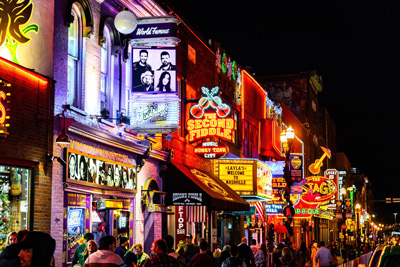
- Population: 689,447
- Known for: Policy and regulation
Nashville has rightly earned a good reputation for pro-business governance. The city offers competitive tax rates, streamlined permit processes and incentives specifically designed to support and foster small business formation and growth.
Local government initiatives prioritize economic development and ease the doing of business, as the Nashville Chamber of Commerce boasts. This makes Nashville one of the best business-friendly cities for entrepreneurs seeking a supportive regulatory environment. A WalletHub study also named Nashville as a top city to start a business in recent years.
7. Raleigh, North Carolina

- Population: 467,665
- Known for: Quality of life
Raleigh strikes the balance between work and play. It’s a top city for entrepreneurs looking for economic opportunities and a vibrant culture. Known for its safety, entertainment and arts, quality education systems and ample recreational opportunities, this city offers a well-rounded living environment.
A significant number of startups stay in business after the one-year mark in Raleigh, which is a rarity in this competitive economy. Business owners also benefit from access to parks, museums and numerous family-friendly amenities. Plus, U.S. News and World Report ranks Raleigh as number five in terms of quality of life in the country. In addition, the Raleigh metro area was named as a top place to start a business according to a LendingTree study.
8. Atlanta, Georgia

- Population: 498,715
- Known for: Access to talent
Atlanta is sometimes lovingly referred to as the “Silicon Valley of the South” thanks to its thriving talent pool of over 156,000 tech professionals. Harvard Business Review highlights the city as a central destination for companies seeking to recruit talent from traditionally underrepresented communities. For entrepreneurs focused on recruiting dynamic teams, Atlanta ranks among the best cities to start a business.
Local universities such as Georgia Tech and Emory University contribute a steady stream of highly educated graduates to the job market in this thriving Southern metropolis, fueling industries like fintech, cybersecurity and data science. Additionally, Atlanta has been recognized in research by Home Bay as one of the best cities to start a small business in.
9. Columbus, Ohio
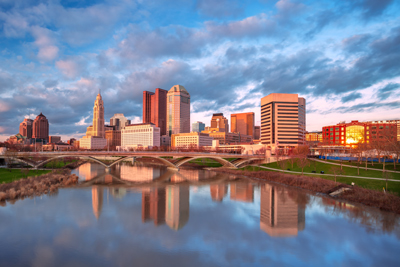
- Population Size: 905,748
- Known for: Scalability and long-term growth
Columbus has emerged as a rising star for entrepreneurs looking to scale their businesses over time. As one of the fastest-growing metro areas in the Midwest, the city has added more than 500,000 residents since 2000. Its central location provides efficient access to major markets across the country, and its expanding population offers a growing customer base for businesses to tap into. Real estate remains relatively affordable in Columbus, allowing companies to secure larger commercial spaces as they grow.
In addition to demographic momentum, Columbus benefits from substantial infrastructure investments and a diversifying economy. In recent years, the region has attracted tech and logistics companies alike, including a $10 billion expansion from Amazon Web Services, which further signals long-term growth potential. Supportive city planning, ongoing public-private initiatives and workforce development programs add to Columbus’ appeal as one of the best small cities to start a business with room for sustainable expansion. The Zebra ranks Columbus among the top 10 best places to start a small business according to its research as well.
10. Portland, Maine

- Population Size: 68,408
- Known for: Unique and hospitable business environment
A small community with a big culinary culture, many of Portland’s local businesses involve food. Maine Foodie Tours offers culinary walking tours of the city for those interested in touring the city before doing business there to get a taste of its culinary delights.
For budding startups, the Portland Regional Chamber of Commerce provides members with free meeting space and discounts on cellphone plans, health insurance, credit card processing and Apple products. Portland has also become a top destination in the U.S. for national business events and conferences, which makes networking on a national level quite a bit easier for its thriving business community members.
Characteristics to Consider When Choosing a City to Start a Business In
Location is an important consideration when it comes to starting a business, and there are many factors that can make a city an ideal location. Cities with affordable housing, utilities and general expenses allow entrepreneurs to keep personal and operational costs low. The Council for Community and Economic Research’s cost of living indices are a great place for entrepreneurs to start their search for the right location and compare cities objectively.
Of course, access to funding matters too. The best cities often have a robust venture capital presence, angel investor networks and startup accelerators. Cities where business owners can attract significant early-stage capital make it a lot simpler to get things up and running and off the ground. But cost of living and access to funding aren’t the only two characteristics business owners should consider. Below you’ll find a list of essential characteristics that make a city ideal for starting and doing business, plus a top city pick for each category. Get details about what makes each top city excel as a small business hub to start your search.
Discover the Best City to Start Your Business
Selecting the right city to start a business is one of the most important decisions entrepreneurs can make. The best cities to start a business combine affordability, access to talent, strong economic growth and supportive ecosystems that foster innovation and networking. From bustling innovation hubs like Austin and Boston to smaller communities with rich entrepreneurial cultures like Wilmington and Portland, each city offers unique advantages tailored to different business needs and lifestyles.
By carefully considering factors like economic strength, local support systems, affordability, innovation record, culture, policy, quality of life, access to talent, scalability and unique draws, entrepreneurs can find the right location. Discover a city that not only supports your startup’s immediate needs but also provides room for sustainable growth and long-term success.
Ultimately, the most successful entrepreneurs leverage their city’s strengths while building resilient, adaptable businesses. Whether you’re launching a tech startup, a small local business or a scalable company, choosing the right city can give you a powerful competitive edge on your journey.
This article was updated in August 2025. Photo by Sean Pavone/Shutterstock.com



